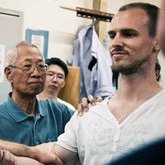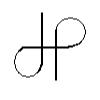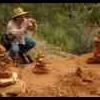-
Content count
3,394 -
Joined
-
Last visited
-
Days Won
13
-

Ungrounded despite grounding – is this a mismatch?
Mark Foote replied to Kati's topic in General Discussion
Moshe Feldenkrais observed that people often hold their breath when they get up out of a chair. He saw the restriction of the movement of breath as a failure to realize physical equilibrium as the basis for movement; he explained how the movement of standing follows from a state of equilibrium and a shift in the center of gravity: …good upright posture is that from which a minimum muscular effort will move the body with equal ease in any desired direction. This means that in the upright position there must be no muscular effort deriving from voluntary control, regardless of whether this effort is known and deliberate or concealed from the consciousness by habit. …When the center of gravity has really moved forward over the feet a reflex movement will originate in the old nervous system and straighten the legs; this automatic movement will not be felt as an effort at all. (“Awareness Through Movement”, © 1972, 1977 Moshe Feldenkrais, p 76, 78) To help his students learn how to stand without holding their breath, Feldenkrais taught three simple exercises that could be done while seated on a chair: first, he said, lean the upper body forward and backward; second, tip the upper body from side to side; and third, with the torso, neck and head held in a straight line, circle the top of the head around the base of the tailbone. (D. L. Bartelink, “No Special Effort”, and the “Best of Ways”) The thing about Tai Chi is that it is a single-weighted art. The weight in a given pose in the form should be through one leg to the floor, and in the opposite arm and hand. Each movement shifts the weight to the opposite leg and arm. Coordinated-bilateral exercises are specifically designed to use both sides of the body and more body parts simultaneously to perform bilateral movements while crossing the midline of the body [2, 28]. Coordinated-bilateral movements engage both hemispheres of the brain and may facilitate cognitive development of cerebellum and prefrontal cortex [29, 30]. Budde et al. [2] found that the coordinated-bilateral exercise in physical education (PE) lessons led to significant improvements in children's attention assessed with d2 Test of Attention. (Impact of Coordinated-Bilateral Physical Activities on Attention and Concentration in School-Aged Children; Heidi Buchele Harris 1, Kai Schnabel Cortina 2, Thomas Templin 1, Natalie Colabianchi 1, Weiyun Chen) A thing which I have found helpful, and which you might try: when you feel that you are rooted in one leg and weighted in the opposite arm, open that opposite arm as though pulling the body around a pole. Doesn't take much pull, to cause a Feldenkrais-like "reflex movement" turning the body in the opposite direction, to the next pose. It's a lot like pressing the arm against the wall, and then when you step away, the arm rises without willing it to rise. Sometimes I feel that opening that opposite arm is pulling me into the ground of the leg with the weight, before the turn. -

How do you know if a Qigong form truly fits you?
Mark Foote replied to Kati's topic in General Discussion
There used to be a tradition among Cheng Man-Ch'ing's students to offer the first part of his form for free in local parks, weekly. I've been practicing that first part of the form for a decade and some now, thanks to a teacher in a local park years ago. I bought Cheng Man-Ch'ing's "Thirteen Chapters" maybe 40 years ago. The Doug Wile translation has some things not in the Benjamin Lo translation, but Wile's translation was apparently pirate. I realize you are talking qi gong, not Tai Chi. Chunyi Lin is most amazing, for sure. Cheng Man-Ch'ing did have one caution in his book, and that concerned the mastery of the ch'i moving from the dan t'ien through the tailbone and up the spine. That, he said, should never be forced, and he counseled a teacher at that point in the mastery of the art. Never one to follow such advice; from something I'm writing: When a person is self-conscious, the single place associated with consciousness is in the body, but not of the body—it’s just an empty place. ... the “one-placedness” of self-consciousness can shift and move, especially from inbreath to outbreath and outbreath to inbreath. “One-placedness” is highlighted in the metaphor that Gautama provided for the first concentration: … just as a handy bathman or attendant might strew bath-powder in some copper basin and, gradually sprinkling water, knead it together so that the bath-ball gathered up the moisture, became enveloped in moisture and saturated both in and out, but did not ooze moisture; even so, (a person) steeps, drenches, fills, and suffuses this body with zest and ease, born of solitude, so that there is not one particle of the body that is not pervaded by this lone-born zest and ease. (AN 5.28, tr. PTS vol. III pp 18-19) A person gathers and firms the “one-placedness” of self-consciousness by extending zest and ease, such that “there is not one particle of the body that is not pervaded” by the feelings of zest and ease. In falling asleep, the mind can sometimes react to hypnagogic sleep paralysis with an attempt to reassert control over the muscles of the body, causing a “hypnic jerk”. The extension of a weighted zest and ease can pre-empt the tendency to reassert voluntary control in the induction of concentration, and make possible a conscious experience of “reflex movement” in inhalation and exhalation. The ch'i acting in the body to inhale and exhale, when ch'i manifests in the skin and hair: With this method of circulating the ch’i (T’ai Chi), it overflows into the sinews, reaches the bone marrow, fills the diaphragm, and manifests in the skin and hair. ( “Master Cheng’s Thirteen Chapters on T’ai-Chi Ch’uan”, Cheng Man-Ching trans. Douglas Wile, pg. 17 ) From the back page of my book: My life has been 50 years trying to figure out how the zazen that gets up and walks around fits into a normal life, and likewise trying to figure out how zazen sits zazen so I can sit as long as I feel I need to sit without wrecking my knees. -
When we let go of our minds and cast aside our views and understandings the Way will be actualized. One sage clarified True Mind (Reality) when he saw peach blossoms and another realized the Way when he heard the sound of tile hitting a bamboo. They attained the way through their bodies... (“Shobogenzo-zuimonki”, sayings recorded by Koun Ejo, translated by Shohaku Okumura, 2-26, pg 107-108, ©2004 Sotoshu Shumucho) An explanation, from my Waking Up and Falling Asleep: ... In my experience, the practice is the same, whether I am waking up or falling asleep: when I realize my physical sense of location in space, and realize it as it occurs from one moment to the next, then I wake up or fall asleep as appropriate. This practice is useful, when I wake up in the middle of the night and need to go back to sleep, or when I want to feel more physically alive in the morning. This practice is also useful when I want to feel my connection to everything around me, because my sense of place registers the contact of my awareness with each thing, as contact occurs. Just before I fall asleep, my awareness can move very readily, and my sense of where I am tends to move with it. This is also true when I am waking up, although it can be harder to recognize (I tend to live through my eyes in the daytime, and associate my sense of place with them). When my awareness shifts readily, I realize that my ability to feel my location in space is made possible in part by the freedom of my awareness to move. From Case 42 of the Blue Cliff Record: Layman Pang was leaving Yaoshan. Yaoshan ordered ten of his Zen students to see Pang off at the temple gate. Pang pointed to the falling snow in the air and said, “Beautiful snow-flakes! — they don’t fall on any other place.”
-
That would be the sixth patriarch of Ch'an, who saw the light in a crowded marketplace when an itinerant Buddhist preacher read the following line from the Diamond Sutra: Let the mind be present without an abode. (from the Diamond Sutra, translation by Venerable Master Hsing Yun from “The Rabbit’s Horn: A Commentary on the Platform Sutra”, Buddha’s Light Publishing pg 60) Or maybe you were thinking more like: When we let go of our minds and cast aside our views and understandings the Way will be actualized. One sage clarified True Mind (Reality) when he saw peach blossoms and another realized the Way when he heard the sound of tile hitting a bamboo. They attained the way through their bodies. Therefore, when we completely cast aside our thoughts and views and practice shikantaza, we will become intimate with the way… This is why I encourage you to practice zazen wholeheartedly. (“Shobogenzo-zuimonki”, sayings recorded by Koun Ejo, translated by Shohaku Okumura, 2-26, pg 107-108, ©2004 Sotoshu Shumucho) "The Way will be actualized"--that's like something Dogen wrote in "Genjo Koan": When you find your place where you are, practice occurs, actualizing the fundamental point. When you find your way at this moment, practice occurs, actualizing the fundamental point… (“Genjo Koan [Actualizing the Fundamental Point]”, tr. Kazuaki Tanahashi, included in his “Enlightenment Unfolds”) Shunryu Suzuki told Blanche Hartman: Don’t ever think that you can sit zazen! That’s a big mistake! Zazen sits zazen! (“Interview with Blanche and Lou Hartman” 10/9/95, conducted by David Chadwick–from cuke.com) The fundamental point sits zazen, and what is that other than this consciousness, right here?
-
Don't be like that, Lairg! To me, the things you talk about are like dreams, but as Bindi points out dreams can piece together images in a way that has significance outside of dreams.
-
I agree entirely. About the "zest and ease": There can also come a moment when the feelings of zest and ease cease, yet “one-pointedness” and the conscious experience of “reflex movement” in inhalation and exhalation remain. At such a time, said Gautama: … seated, (one) suffuses (one’s) body with purity by the pureness of (one’s) mind so that there is not one particle of the body that is not pervaded with purity by the pureness of (one’s) mind. (AN 5.28, tr. PTS vol. III pp 18-19, parentheticals paraphrase original) The “pureness of mind” that Gautama referred to is the pureness of the mind without any will or intention to act in the body. There is a feeling of freedom, when the activity of inhalation and exhalation is “reflex movement” regardless of where “one-pointedness” takes place. Zen teachers demonstrate the relinquishment of “voluntary control” of the body in favor of the free location of “one-pointedness of mind”, and they do so constantly. Reb Anderson observed such demonstrations in the actions of Shunryu Suzuki: … I remember (Suzuki’s) dharma talks and I remember him in the zendo—that was wonderful teaching. I remember him moving rocks—wonderful teaching. I remember seeing him eat—that was wonderful teaching. He was teaching all the time in every situation. But when he couldn’t sit anymore and couldn’t walk anymore, he still taught right from there. (Reb Anderson, from a 1995 recording) About the freedom: So, when you practice zazen, your mind should be concentrated in your breathing and this kind of activity is the fundamental activity of the universal being. If so, how you should use your mind is quite clear. Without this experience, or this practice, it is impossible to attain the absolute freedom. (Breathing; Shunryu Suzuki; November 4th 1965, Los Altos; emphasis added) What will be the difference? You have freedom, you know, from everything. That is, you know, the main point. (Sesshin Lecture, Shunryu Suzuki; Day 5 Wednesday, June 9, 1971 San Francisco) In Gautama’s parlance: And what… is the ceasing of action? That ceasing of action by body, speech, and mind, by which one contacts freedom,–that is called ‘the ceasing of action’. (SN 35.146, tr. Pali Text Society vol IV p 85)
-
That sounds great. I tried playing with the color myself, feeling slightly unsatisfied with it, but I couldn't improve on it. Your mother is very talented, even if she open-sourced the outline, and I look forward to her further application of that talent! Lucky us, thanks liminal_luke, thanks liminal_luke mom!
-
I like it--I'm wondering where you got the horse, hopefully open-source!
-
Is this an external philosophy, or just a statement of fact? You are not your body, but you are the consciousness in the body, because of which you have the awareness of “I am”. It is without words, just pure beingness. Meditation means you have to hold consciousness by itself. The consciousness should give attention to itself. (Gaitonde, Mohan [2017]. Self – Love: The Original Dream [Shri Nisargadatta Maharaj’s Direct Pointers to Reality]. Mumbai) For most people, that's what's actually missing, how it can be known, and how it can be reinstated IMHO. From something I'm writing: A person gathers and firms “one-pointededness” (of consciousness held by itself) by extending zest and ease such that “there is not one particle of the body that is not pervaded” by the feelings of zest and ease. As I wrote previously: The weight of the body sensed at a particular point in the body can shift the body’s center of gravity, and a shift in the body’s center of gravity can result in what Moshe Feldenkrais termed “reflex movement”. Feldenkrais described how “reflex movement” can be engaged in standing up from a chair: …When the center of gravity has really moved forward over the feet a reflex movement will originate in the old nervous system and straighten the legs; this automatic movement will not be felt as an effort at all. (“Awareness Through Movement”, Moshe Feldenkrais, p 78) “Drenching” the body “so that there is not one particle of the body that is not pervaded” with zest and ease allows the weight of the body and “one-pointedness” to effect “reflex movement” in the activity of the body. In falling asleep, the mind can sometimes react to hypnagogic sleep paralysis with an attempt to reassert control over the muscles of the body, causing a “hypnic jerk”. The extension of a weighted zest and ease can pre-empt the tendency to reassert voluntary control in the induction of concentration, and make possible a conscious experience of “reflex movement” in inhalation and exhalation. (“The Place Where You Stop and Rest”) The moment-to-moment continuation of conscious experience of “reflex movement” marks the cessation of choice in inhalation and exhalation, a cessation that, once experienced in the course of holding consciousness by itself, can be touched on in the course of daily living to provide a rhythm of mindfulness.
-
Yes, I like the feeling of Nungali's horse. The flame was offered free online, I thought it helped sell the horse as a fire horse, but I can submit the horse without it. Doesn't sound like the professionals on the site are approving of the horse, though...
-
Breatharians: Cult rocked by charges of leader's secret snacking By Dana Gluckstein
-
The video not live, but I like the feeling she put into the song.
-
Bass player on that track was Jack Cassidy, mostly known as the bass player of the Jefferson Airplane. He liked a punk band in LA so much he decided to play with them--here they are at the Oakland Coliseum in 1979:







.thumb.jpg.0279361507cce6eb60b037b7a68d8dc9.jpg)









